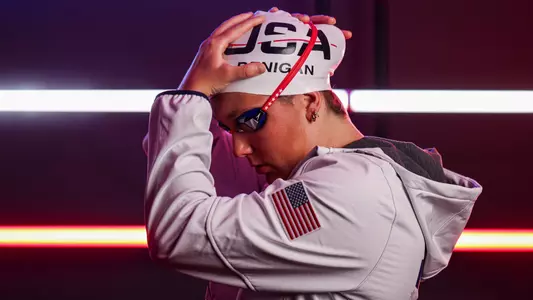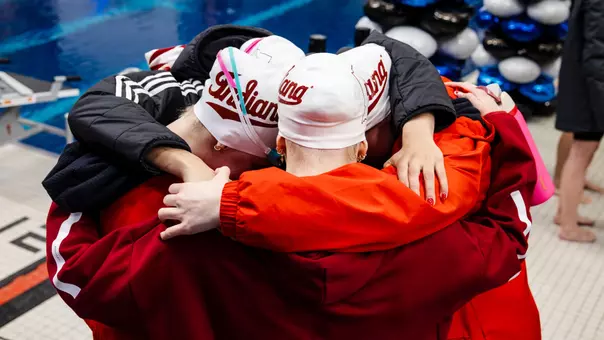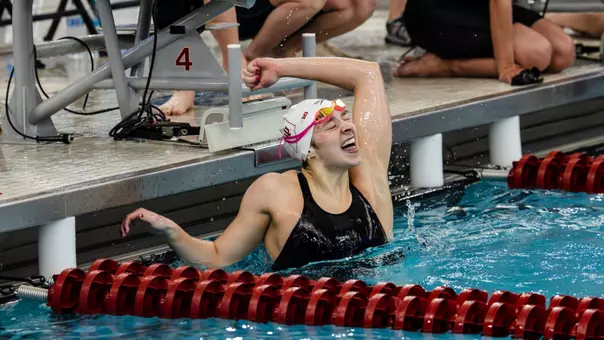Indiana University Athletics

DiPrimio: Denigan Is ‘Special’ Swimmer for ‘Special’ Sport
7/18/2024 6:14:00 PM | Women's Swimming and Diving, Olympics
By Pete DiPrimio
IUHoosiers.com
BLOOMINGTON, Ind. – The mystery that is open water swimming looms large and Mariah Denigan offers clarity. Would you expect anything less from the Indiana senior swimming standout and Paris Games Olympian?
"A lot of people, even in the swimming world, don't understand open water," Denigan says from a recent press conference at Simon Skjodt Assembly Hall's media room. "They don't understand how different it is and how flexible you have to be on race day."
Flexibility ranges from adjusting to swimming conditions to weather unpredictability to the kind of physical punishment normally reserved for, well, rugby.
"I've been to races where, the day before, the water was completely flat," Denigan says, "And then race day comes and you have wind and three-foot waves you have to swim through. You have to be willing to roll with the punches."
She's not kidding about the punches.
In swimming pool races, competitors must stay in their lanes. Open water has no such restrictions, so swimmers can get kicked, elbowed, bumped and, in short, roughed up during races.
"It's like running a marathon with no rules on contact," says IU associate head coach Cory Chitwood, who will serve as an open water assistant coach for Team USA. "It can become a bit of a football game in the middle of a marathon race. That part of it adds a new dynamic."
Denigan embraces that dynamic as she prepares to compete in the Olympics' open-water 10,000-meter (6.2-mile) event. It's sent for Aug. 8-9 in the Seine River. This will be the first time an IU swimmer has competed in this event. She is one of 20 Hoosier athletes and coaches participating in the Olympics.
"From a physicality standpoint, I left the last World Cup with a huge bruise on my face," she says. "You have to deal with different components during a race. It's about keeping your emotions at a low so you still can have a good race and go through with the race plan."
Chitwood is well versed in open water swimming challenges. He's been a national team coach for nine years, and the head coach twice, at the 2022 and 2024 World Aquatics Championships. He's coached distance swimming for the Hoosiers for the last five years.
"It's one of the most grueling events you'll find in the Olympic Games," he says. "There's the endurance component, the length of the race in swimming 6.2 miles in around two hours. Then there are all the unknowns."
Denigan has progressed though those unknowns with punishing training that can mean swimming 70,000 to 80,000 yards per week (about 40 to 45 miles). At IU, she has placed seventh in the NCAA 1,650-yard freestyle each of the last two seasons. She competed on for USA Swimming's Open Water national team for the last three world championships. In the 10K, she improved from 15th in 2022 to eighth in 2023 to sixth last winter in Qatar (just 4.5 seconds out of first) to qualify for the Paris Games.
Denigan's strength is her late-race speed. IU head coach Ray Looze calls her fitness, mental toughness and pain tolerance "off the charts." Chitwood agrees.
"It's a special sport," he says, "and it takes someone special to compete at a high level like Mariah has for the past three years. It's been amazing to see."
Denigan began distance swimming at age 10 at a northern Kentucky lake. She says she did it for "the fun stuff afterward." In other words, boating and going to cookouts with friends. Then it got serious. She quickly reached age-group times that rated among the nation's best.
"I had my first competition and fell in love with it," she says. "I won my first 1K swim, and never dropped it."
International open water swimming, also known as marathon swimming, was once 25,000 kilometers with races lasting more than five hours. It was added to the Olympic program as a 10K in 2008.
"It's one of the most beautiful sports in the world," Chitwood says. "You go to amazing places. The community is fantastic.
Adds Denigan: "You're always at a beautiful location, some beautiful ocean where you can see the bottom or some beautiful country. I feel fortunate to experience different cultures through this sport I love so much."
Love faces this Olympic reality: Paris officials scheduled the open water event for the Seine River, which has carried controversy in the buildup to the Summer Games.
Until the Olympics, swimming had been banned in the river since 1923 because of dangerous levels of enterococci and E. coli bacteria. As part of its Olympic preparations, France launched a $1.5 billion clean-up project that included a 50,000 cubic meter reservoir that went operational in mid-June. Still, rain can cause wastewater to enter the Seine, as it did during last month's French (tennis) Open. Paris officials hope typical dry July weather will eliminate the problem.
Just in case, officials devised a Plan B. If unsafe water conditions occur, the event will be switched to the Vaires-sur-Marne Nautical Stadium, which will also host rowing and canoeing.
"It all comes back to flexibility and being able to deal with water quality," Denigan says. "I'd be lying if I said I wasn't nervous about racing in [The Seine]. I don't want to get sick. Team USA won't put us in any compromising situation.
"I hope the water quality is good and it all works itself out."





